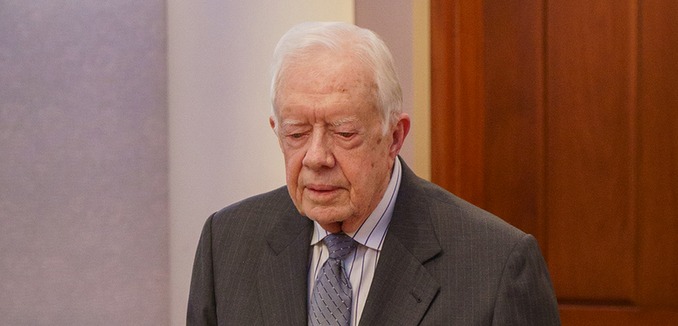President Barack Obama should break with American diplomatic practice and use the United Nations Security Council to recognize a Palestinian state, former president Jimmy Carter wrote Tuesday in The New York Times.
Carter noted that United Nations Security Council Resolution 242, which was passed in the wake of the 1967 Six-Day War and continues to serve as the basis of Arab-Israeli peacemaking, calls for Israel to withdraw from territories that were captured during that conflict. Because Israel continues to maintain a presence in the West Bank, the U.S. should support a Security Council resolution that outlines acceptable parameters for an Israeli-Palestinian peace accord.
The resolution “should reaffirm the illegality of all Israeli settlements beyond the 1967 borders, while leaving open the possibility that the parties could negotiate modifications,” Carter wrote. “Security guarantees for both Israel and Palestine are imperative, and the resolution must acknowledge the right of both the states of Israel and Palestine to live in peace and security. Further measures should include the demilitarization of the Palestinian state, and a possible peacekeeping force under the auspices of the United Nations.”
But Carter’s reading of Resolution 242 and the conclusions he draws from it are mistaken. Carter cites two clauses from the resolution to support his points: “the inadmissibility of the acquisition of territory by war and the need to work for a just and lasting peace in the Middle East in which every state in the area can live in security,” and the “withdrawal of Israel armed forces from territories occupied in the recent conflict.” The first clause is part of the resolution’s preamble and not one of its operative clauses, which have more legal weight. And as for the second clause, the drafters of the resolution were very clear that they did not intend for Israel to fully and totally return to the 1949 armistice demarcation lines, described by Carter as the “1967 borders.”
U.S. Undersecretary of State for Political Affairs Eugene Rostow, who helped write the resolution, clarified in 1970 that the text of the resolution mandating “withdrawal…from territories”—rather than, for example, “withdrawal…from all territories”—meant that “it is therefore not legally possible to assert that the provision requires Israeli withdrawal from all the territories now occupied under the Cease-Fire Resolutions to the Armistice Demarcation Lines.”
Carter’s predecessor, President Lyndon Johnson, also said in a speech shortly after the war’s conclusion that he opposed such a move. “There are some who have urged, as a single, simple solution, an immediate return to the situation as it was on June 4 [the day before the war started],” Johnson said. “As our distinguished and able Ambassador [to the United Nations], Mr. Arthur Goldberg, has already said, this is not a prescription for peace but for renewed hostilities.”
In his historic 1993 letter to then-Israeli Prime Minister Yitzhak Rabin, Yasser Arafat, the first president of the Palestinian Authority, renounced terror and promised that all “outstanding issues relating to permanent status will be resolved through negotiations.” This laid out two of the accepted principles of an eventual peace deal between Israel and the Palestinians: abandoning terror and bilateral negotiations.
More than 20 years later, the Palestinian Authority continues to pay millions of dollars to jailed terrorists or their families. Supporting a Security Council resolution that demarcates Israel’s borders at the 1967 lines, as Carter advocates, would reward Palestinian Authority President Mahmoud Abbas for refusing to negotiate meaningfully with Israel over the past eight years. In fact, Abbas wrote in a 2011 New York Times op-ed that he sought to internationalize the conflict with Israel, rather than negotiate terms of peace bilaterally.
Carter’s proposal is not only dependent on a dubious reading of history and the law, but may also exacerbate Abbas’ demonstrated intransigence by giving him leverage and allowing him to avoid negotiating unless it is under his terms. Most assuredly, it will not bring peace.
[Photo: LBJ Library / WikiCommons ]




